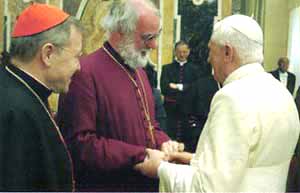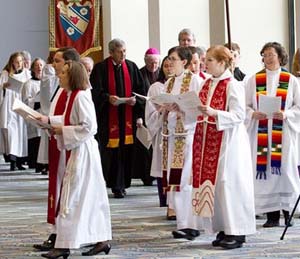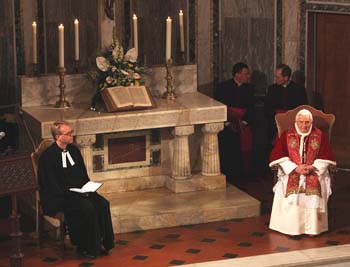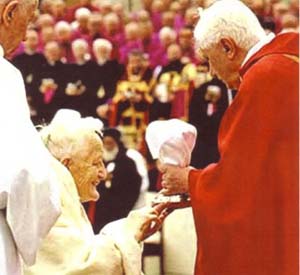 |
Crisis in Ecumenism
The Impossible Hermeneutics of Continuity
Mark Stabinski
In a recent news article titled "Cardinal Kasper says lack of shared communion his greatest regret," the apostasy of the Conciliar Church's ecclesiastical Hierarchy is demonstrated anew. The recently retired president of the Pontifical Council for Promoting Christian Unity said that his biggest regret during his long tenure in Rome is that he did not achieve an agreement with Protestants.

Kasper always backed by Benedict XVI |
"Today, there is a lot of convergence. So, we got closer to each other but we could not achieve the final breakthrough. I regret it very much,” he stated.
Even the simplest of genuinely Catholic intellects are compelled to admit - given the words spoken here by the recently retired Cardinal Walter Kasper confessing his "greatest regret" – that the post-Vatican II ecumenism he has untiringly promoted has failed in its half-century labor to bring forth union with Protestants.
Kasper’s goal, in fact, simply cannot be reconciled with with nearly 2,000 years of Holy Mother Church's dogmatic Magisterial Teaching, which always told us not to reconcile with heretics.
Kasper colleagues deny Catholic doctrine
Although the unchangeable Catholic Doctrine decrees that there can be no communion with non-Catholics, let me demonstrate how different the thinking of the inspirers of the New Church that was born at Vatican II is. I invite my readers to consider the following texts of some of Kasper's good friends:
Edward Schillebeeckx, a Vatican II perito, affirms the ‘new’ Conciliar teaching that the Church includes other so-called religions:

Bishop Boland of Savannah in a Lutheran service making pro-homosexual Scott Benahase a 'bishop' |
"By admitting that other Christian communities are also Church, the Council made a judgment on the incapacity of the Church herself to realize the plenitude and unity desired by Christ. It is difficult to say that the Catholic Church is still one, when one says that others are equally one, catholic and apostolic... At Vatican Council II, the Roman Catholic Church officially abandoned her monopoly over the Christian religion" (in Atila Sinke Guimaraes, Animus-Delendi II, chapter IX).
Another Vatican II perito, L.A. von Geusau, also emphasizes the impact of the Council documents on making a new definition of the Church:
"It must be admitted, that the Catholic Church is no longer something precise, defined and sufficient unto herself. With the Conciliar Decree on Ecumenism, it is no longer possible to speak of the Church without also understanding and including in this notion the churches of the East and the Reformation" (ibid).
Hans Kung, a Vatican II perito under suspicion of heresy before the Council, gives us a vision of the Church of tomorrow:
"The road leading to unity does not consist of 'the return' of one church to the other... The daughters (heretical/apostate/and schismatic sects) fear being absorbed ... for this Mother (the Catholic Church) not only has become old and torpid, backward and petty of spirit, but also confused and dispersed. Her gaze seems to have become clouded ... Her faith has become too superstitious, her love too legalistic, and her hope too earthly. From this time forward, you can begin to make your contribution to the construction of the Church of Tomorrow: a Church that will know neither separation of confessions or of generations" (ibid.)
Another Vatican II perito previously under suspicion of heresy, today considered “conservative,” is Henri de Lubac, who affirms:

Benedict prays with Kruse in the Lutheran temple in Rome |
"In the end, what must take place is the unification of everything in God, not by fusion, but by a 'differentiating synthesis' into a vast network of personal relations. It is this vision of final unity to which Teilhard de Chardin gives the name 'pantheism of love' or 'Christian' pantheism” (ibid.)
Then, there is Joseph Ratzinger, today Benedict XVI, who states:
"At the table of the Lord, when men consume the body of Christ, they themselves become the body of Christ and are assimilated into the body of the New Adam...The table of God...is both the place of true communion of men among themselves and the place where men communicate with God...and all fuse together to form the new man" (ibid).
Lest my readers complain and say that Benedict XVI has changed and become conservative, let them hear the words of Kasper himself. In the recent interview, while he admits that “some sections of the Catholic Church have difficulties” with his ecumenical initiatives, he affirmed he had the firm backing of both Pope John Paul II and Pope Benedict XVI.
I could write ad infinatum citing other texts along the same lines by modern theologians, but I believe these are sufficient to show that Vatican II ecumenism is supported by a completely new and false thinking about the Church.
Some Church teachings
Now, let me refresh my readers' memory with some traditional Catholic teaching. For my quotes I credit Michael Malone’s Apostolic Digest, Book IV, Chapter 6 “There can be no communion with Christians.”
Pope St. Clement taught: If any man shall be friendly to those with whom the Roman Pontiff is not in communion, he is in complicity with those who want to destroy the Church of God; and, although he may seem to be with us in body, he is against us in mind and spirit, and is a much more dangerous enemy than those outside. (Pope St. Clement I)

Unthinkable before Vatican II: Card. Ratzinger gives Communion to Protestant Roger Schutz |
Pope Innocent III was also very clear: It is impossible for us to hold communion after their death with those who have not been in communion with us during their life. (Pope Innocent III)
This traditional teaching was confirmed by Pius XI: This Apostolic See has never allowed its subjects to take part in the assemblies of non-Catholics.
The Third Council of Constantinople also decreed: If any ecclesiastic or layman shall go into the synagogue of the Jews or to the meetinghouses of the heretics to join in prayer with them, let them be deposed and deprived of communion. If any Bishop or priest or deacon shall join in prayer with heretics, let him be suspended.
The Council of Cartage: One must neither pray nor sing psalms with heretics, and whosoever shall communicate with those who are cut off from the communion of the Church, whether clergy or layman: let him be excommunicated.
The coherent words of St. Ignatius of Antioch still echo today: What communion does light have with darkness, or Christ with Belial? Or what portion does truth have with falsehood? Or righteousness with unrighteousness? Or true doctrine with that which is false?
St Louis Grignion de Montfort synthesizes the Catholic position: Predestinate souls, you who are of God, cut yourselves adrift from those who are damning themselves!
An impossible hermeneutics of continuity
Strong language? Explicit language? Yes, a fearsome language spoken by Catholics on fire with zeal for Holy Mother Church and the salvation of all souls.
What conclusions can we draw from this Catholic teaching?
These precepts have been handed down from one generation to the next, sacredly guarded, loved and practiced in essentially the same way by all men in all times in all places. They were treasured and followed because this was the way of salvation revealed by God to man.
Today's progressivists pretend to be charitable but they oppose these teachings. They purposely forget that charity is lifeless outside the Spirit of Truth. They are the spiritually blind leading the blind into the Abyss that Our Lord Himself warned us about when He walked the earth.
To be entirely honest, the language spoken and the theology expressed by the cited progressivists are openly contradictory to the language and theology of the Catholic Church, likewise cited above. They are diametrically opposed to each other.
To claim that a hermeneutics of continuity can somehow yet be found in these two very divergent faiths is a fool’s dream. It violates the law of contradiction and leads such seekers to the margins of either madness or, simply, general contempt for God. There is no third alternative.

Posted July 30, 2010

Related Topics of Interest
 Declaration of Resistance to the Vatican Ostpolitik Declaration of Resistance to the Vatican Ostpolitik
 More Reasons for Catholics to Resist More Reasons for Catholics to Resist
 Paul VI with Protestants Who Helped Write the New Mass Paul VI with Protestants Who Helped Write the New Mass
 JPII Preaching at an Anglican Temple JPII Preaching at an Anglican Temple
 Brother Schutz Did Not Convert from Protestantism Brother Schutz Did Not Convert from Protestantism
 Praying with Heretics - Where Is the Resistance? Praying with Heretics - Where Is the Resistance?

Related Works of Interest
|
|
Crisis in Ecumenism | Hot Topics | Home | Books | CDs | Search | Contact Us | Donate
 © 2002-
Tradition in Action, Inc. All Rights Reserved
© 2002-
Tradition in Action, Inc. All Rights Reserved
|
 |
|